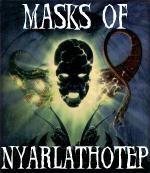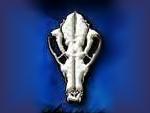

Beasts of the Moon
excepted from Werewolf;the Forsaken
Werewolves are born monsters in human skin, never knowing their true selves until they change under the moon for the first time. They walk in two worlds but are welcome in neither. They call human and spirits "family" but are loved by neither. Human reason wars with beatial instinct; the ever-shifting moon pulls at the tides of their blood.
Though the Uratha refuse to forget their dim stories of Pangaea and the tragic but necessary death of Father Wolf, the days of legend are long gone. Now werewolves hunt through forests of asphalt, brick and glass as well as the deep woods, their claws tested against gunpowder and steel. They are the predators of the modern age.
Heart of the Wolf
Even if a werewolf believes that he's still essentially human under it all, his own heart denies that lie. His instincts grow strong over time. When hungry, he craves meat - the fresher and bloodier the better. When alone, he craves company - the reassuring presence of a pack soothes him in ways that solitude never can. Lupine instincts colour his waking moments, and he dreams of prey and the moon.
His sense show him aspects of the world that he never saw before. When he wears a human skin, he feels claustrophobic. His eyesight is as strong as ever, but his other senses are greatly diminished. Only when he shapeshifts can he enjoy the full ranger of his senses. It seems a small thing, but it always affects him.. He's always aware that he's missing things that he would otherwise hear or smell. Over time, he becomes more alienated from wearing human form and more comfortable in his Dalu form - frightening for those who once wanted only to go back to their human lives.
Werewolves feel emotion at levels that humans can barely match. Their joys are more profound, their melancholies more overwhelming. Yet nothing pulses at the heart of a werewolf like anger. Even in childhood, a werewolf has a short temper. As he grows older, the anger in his soul grows stronger and becomes a brutally powerful force. Left alone, it would strangle the life out of him, stifling and suffocating until he collapsed under its weight. The anger needs release, and a werewolf finds that release when he takes Gauru form, the form of Rage. The half-man, half-beast Gauru is a direct conduit for a werewolf's anger, and a werewolf enters this war form solely to unleash his fury.
Yet the war form can take control of a werewolf, clouding his senses in a red haze known as the Death Rage. When overcome by the Death Rage, a werewolf turns on anything nearby, even slaughtering his own friends, family and packmates in his beserk fury. There is nothing left of the human or the wolf - only the monster remains.
As difficult as it is to govern their predatory instincts, werewolves must still try. One who gives in to his anger more often, who hunts when he isn't hungry or eats the flesh of humans or wolves becomes increasingly bestial, until nothing remains but a primeval monster with the vague cunning of a human being. But neither can a werewolf survive by denying his nature. Refusing to shift under the moon and run as a wolf can distort a Uratha's sense of self to the point that he runs mad. A werewolf cannot surrender himself to his predatory desires, but neither can he renounce them. Only by walking the razor-thin path of balance between human and beast can he find a measure of peace. Such moments are fleeting, and all too fragile by moonlight, but they are the heart and soul of why the People fight on.
The Hunt
The hunt is the heart of werewolf existence. Few predators in the worlds of flesh can even compare to an Uratha, and fewer still are as dangerous as an entire pack of werewolves. Uratha are cretures with the razor-sharp senses of a beast, strength beyond any human and the instincts of a killing machine. A werewolf cannot wait idly for some threat to enter his life - he is compelled to hunt. And the choice of prey defines a werewolf, setting the Forsaken and the Pure Tribes at one another's throat.
The Forsaken refrain from hunting human prey - for the most part. They favour preying upon spirits that break into the material world to pursue their alien hungers or dangerous compulsions. Though striking a pact with a spirit is not unheard of, most of these unwanted intruders find themselves the werewolves' prey. Some Forsaken guard the physical world out of a sense of duty or a out of love for their huamn families that these invades place at risk. Others care little for the humans around them, but stalk rogue spirits out of hunger or territorality. They also hunt the descendants of Father Wolf's ancient rivals, known as Hosts - horrible creatures part vermin and part spirit, which become stronger and smarter as they increasure in number. Werewolves hunt humans as well, should those humans pose a threat to their territory.
Yet they are hunted in turn: by bitter spirits who resent these bastard half-flesh wolves' power over the spirit world, and by their own kind. The Pure Tribes have taken the side of the spirits and relentlessly hound the Forsaken. The Hosts explode out of the corners of a territory to bring down any Uratha they find, and some other supernatural denizens of the World of Darkness even go hunting werewolves with silver bullets, perhaps for no reason other than cruelty.
This is the hunter's choice. A werewolf pack must defend its territory against incursion from outside the boundaries, or even from the spirit world. Yet it cannot simply wait for its enemies to make the first move. Werewolves who notice a foe stirring beyond their boundaries must decide whether its worth taking the risk to take the fight to the foe, hunting it down before it has the chance to grow strong enough to post a threat.
The choice is usually a quick one. Uratha are the finest predators to walk under the moon - and predators hunt.